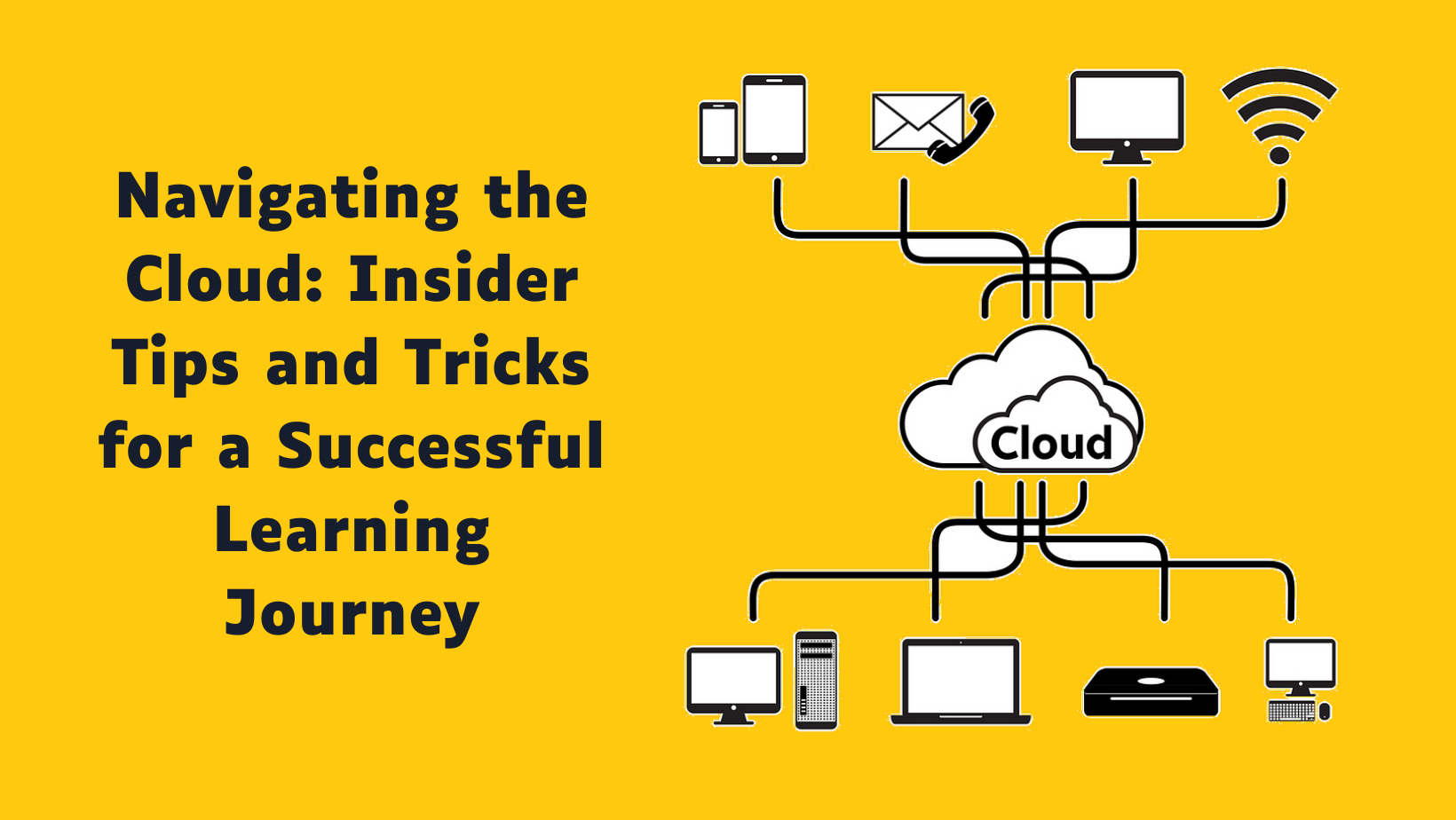Navigating the Cloud: Insider Tips and Tricks for a Successful Learning Journey
 Gous Sayyad
Gous Sayyad
Learning cloud computing effectively involves a combination of theoretical understanding, hands-on experience, and staying updated with industry trends. Here are some tips and tricks to help you learn cloud computing effectively:
1. Understand the Basics:
Start with the fundamentals of cloud computing, including key concepts such as Infrastructure as a Service (IaaS), Platform as a Service (PaaS), and Software as a Service (SaaS).
Familiarize yourself with essential cloud computing models, such as public, private, and hybrid clouds.
2. Choose a Cloud Platform:
Select a prominent cloud service provider like AWS (Amazon Web Services), Azure (Microsoft), or GCP (Google Cloud Platform) to focus your learning efforts.
Each provider has its own set of services and features, so understanding one platform well can make it easier to adapt to others later.
3. Hands-On Practice:
Use the free tier or trial offerings provided by cloud service providers to gain hands-on experience without incurring costs.
Set up virtual machines, storage, and networking configurations to get a feel for the practical aspects of cloud computing.
4. Online Courses and Documentation:
Enroll in online courses offered by platforms like Coursera, Udacity, or A Cloud Guru. Many of these courses provide certifications that can boost your resume.
Read through official documentation provided by the cloud service provider for in-depth understanding and troubleshooting.
5. Certifications:
Consider earning relevant certifications, such as AWS Certified Solutions Architect, Microsoft Certified: Azure Solutions Architect, or Google Cloud Certified - Professional Cloud Architect.
Certifications not only validate your skills but also provide structured learning paths.
6. Networking and Community Involvement:
Join forums, discussion groups, and social media communities related to cloud computing.
Participate in discussions, ask questions, and learn from the experiences of others.
7. Real-World Projects:
Work on real-world projects to apply your knowledge and gain practical experience.
Consider contributing to open-source projects or building your own cloud-based applications.
8. Stay Updated:
Cloud computing is a rapidly evolving field. Stay informed about the latest updates, services, and best practices through blogs, podcasts, and newsletters.
Follow the official blogs and announcements from your chosen cloud service provider.
9. Automation and Scripting:
Learn scripting languages such as Python or PowerShell to automate tasks and manage resources efficiently.
Infrastructure as Code (IaC) tools like Terraform and AWS CloudFormation can be valuable skills.
10. Security Best Practices:
Understand cloud security fundamentals and best practices.
Learn about identity and access management, encryption, and other security features provided by the cloud platforms.
11. Collaboration Tools:
- Familiarize yourself with collaboration tools commonly used in cloud environments, such as Git for version control and platforms like Jira for project management.
12. Soft Skills:
- Develop soft skills such as communication, problem-solving, and teamwork. These skills are essential when working in cloud teams.
Remember, learning cloud computing is an ongoing process, and practical experience is crucial. Balance theoretical knowledge with hands-on practice to become proficient in cloud technologies.
Subscribe to my newsletter
Read articles from Gous Sayyad directly inside your inbox. Subscribe to the newsletter, and don't miss out.
Written by

Gous Sayyad
Gous Sayyad
I'm an experienced professional with expertise in the 𝗖𝗹𝗼𝘂𝗱 𝗮𝗻𝗱 𝗜𝗻𝗳𝗿𝗮𝘀𝘁𝗿𝘂𝗰𝘁𝘂𝗿𝗲 𝗱𝗼𝗺𝗮𝗶𝗻 𝘄𝗶𝘁𝗵 𝗼𝘃𝗲𝗿 𝟰 𝘆𝗲𝗮𝗿𝘀. As an Infrastructure Management Tech, I am well-versed in 𝗔𝘂𝘁𝗼𝗺𝗮𝘁𝗶𝗼𝗻, 𝗖𝗼𝗻𝘁𝗶𝗻𝘂𝗼𝘂𝘀 𝗜𝗻𝘁𝗲𝗴𝗿𝗮𝘁𝗶𝗼𝗻, 𝗮𝗻𝗱 𝗗𝗲𝗽𝗹𝗼𝘆𝗺𝗲𝗻𝘁. 🙂 In addition to 𝗺𝗲𝗻𝘁𝗼𝗿𝗶𝗻𝗴, I create 𝗧𝗲𝗰𝗵𝗻𝗶𝗰𝗮𝗹 𝗰𝗼𝗻𝘁𝗲𝗻𝘁 daily, ensuring that valuable knowledge is accessible 𝐭𝐨 𝐚 wide audience. I believe in 𝗰𝗼𝗻𝘁𝗶𝗻𝘂𝗼𝘂𝘀 𝗹𝗲𝗮𝗿𝗻𝗶𝗻𝗴 𝗮𝗻𝗱 𝗱𝗲𝘃𝗲𝗹𝗼𝗽𝗺𝗲𝗻𝘁 to keep myself up-to-date and up-skilled is the solution to modern-day application development. 𝗞𝗲𝘆 𝗦𝗸𝗶𝗹𝗹𝘀: 𝙇𝙞𝙣𝙪𝙭 𝘼𝙒𝙎 𝘿𝙤𝙘𝙠𝙚𝙧 𝙂𝙞𝙩 𝙖𝙣𝙙 𝙂𝙞𝙩𝙃𝙪𝙗 𝙆𝙪𝙗𝙚𝙧𝙣𝙚𝙩𝙚𝙨 𝘼𝙣𝙨𝙞𝙗𝙡𝙚 𝙏𝙚𝙧𝙧𝙖𝙛𝙤𝙧𝙢 𝙋𝙮𝙩𝙝𝙤𝙣 𝙅𝙚𝙣𝙠𝙞𝙣𝙨 𝙂𝙚𝙣 𝘼𝙄 𝐄𝐦𝐚𝐢𝐥: 𝗴𝗼𝘂𝘀.𝘀𝗮𝘆𝘆𝗮𝗱𝟯𝟬@𝗴𝗺𝗮𝗶𝗹.𝗰𝗼𝗺